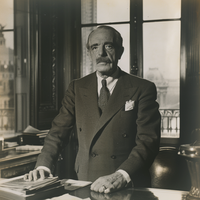Boniface L'Overture
Who's Who of Oportia | |
| Boniface L'Overture | |

| |
| Photo of Boniface L'Overture | |
| Full Name | Boniface L'Overture |
| Parents |
|
| Spouse | Élisabeth Moreau (m. 1705 AN) |
| Children | |
| Birth Date | 28.II.1680 AN |
| Birth Place | Triegon, Natopia |
| Death Date | 14.IX.1729 AN |
| Occupation | Politician, Lawyer |
| Residence | Pahlavye, Oportia |
| Political Affiliation | Conservative Nationalist Party of Oportia |
| Known For | Federal Chancellor of Oportia (1719 AN-1722 AN), Impeachment due to 1721 Oportian protests crackdown |
| Citizenship | |
Boniface L'Overture (28.II.1680 AN - 14.IX.1729 AN) was an Oportian politician and lawyer who served as the Federal Chancellor of Oportia from 1719 AN to 1722 AN under Federal Representative César André. A member of the Conservative Nationalist Party of Oportia, L'Overture was known for his hardline conservative views and his controversial role in the government crackdown on the 1721 Oportian protests.
Born into a prominent Alexandrian family in Triegon, Natopia, L'Overture studied law at the Imperial University of Alexandria and began his career as a corporate lawyer. After practicing in Natopia for years, he soon moved to Oportia in 1708 AN, where he entered politics in 1723 AN when he was elected to the Chamber of Deputies of Oportia as a representative for Pahlavye. L'Overture quickly gained a reputation as a staunch conservative and a vocal critic of the opposition Liberal Progressive Party and Celine Beaumont.
In 1705 AN, L'Overture married Élisabeth Moreau, and the couple had two children together. Throughout his political career, L'Overture's family played a significant role in shaping his public image and supporting his campaigns.
As Federal Chancellor under César André, L'Overture was instrumental in shaping the government's response to the 1721 Oportian protests. The protests, which began as peaceful demonstrations against the government's vote to lift sanctions on Floria and a growing economic crisis, quickly escalated into widespread unrest. L'Overture strongly advocated for a hardline approach to the protests, urging the deployment of military forces and the use of force to quell the unrest. The resulting government crackdown on the protesters led to widespread violence and numerous casualties, sparking public outrage and calls for accountability. In 1722 AN, the Federal Electorate of Oportia voted to impeach both Federal Representative André and Chancellor L'Overture for their roles in the crackdown, as well as the rest of the Federal Cabinet of Oportia.
Following his impeachment, L'Overture largely withdrew from public life and returned to his hometown of Pahlavye. He continued to maintain his innocence and defend his actions during the 1721 protests until his death in 1729 AN.
L'Overture's legacy remains controversial in Oportian history, with many viewing him as a symbol of government oppression and authoritarian tendencies. Others, particularly within the Federal Conservative Union of Oportia (the successor to the Conservative Nationalist Party of Oportia), see him as a strong leader who took necessary actions to maintain order and stability during a time of crisis.